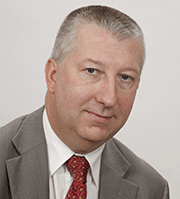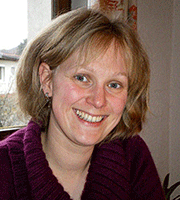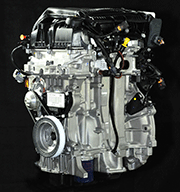E-Archive
Interview
in Vol. 14 - January Issue - Year 2013
A Unique Insight On Shot Peening

Marc Courteaux, Belchamp Test Center, responsible for the Metallic Materials Department, focusing mainly on suspensions and gearboxes

Florence Funck, Belchamp Test Center, specialist of mechanical reinforcement and particularly shot peening

DS3 cabrio

3008 HYbrid4

Engine EB
The Belchamp Technical Center is the most prominent development and testing site of PSA Peugeot Citroën Group. This impressive facility is located in Eastern France between Vosges and Jura, in a woody area, encompassing comprehensive laboratories and road testing tracks, to validate all steps of developing a vehicle. Manned by 1300 people, the Belchamp Technical Center operates an impressive array of 1400 testing equipment stations and 15000 measuring devices with two missions: Evaluating, improving, optimizing materials and parts, and Tuning up and validating components and medium size vehicles. The vehicles, components and parts are assessed on 32 km of tracks, duplicating all kind of roads (city streets, motorways, jungle trail...), under any meteorological circumstances (icy, windy, rainy...), with the mission to ensure maximum safety and performance. The crash test facility, using a 240 m catapult, is probably the most dramatic spot, where destructive tests are conducted to verify and control the active and passive resistance of any vehicles under all kinds of shock. High-speed cameras, shooting 3000 pictures per second, record the crashes under various angles, while hundreds of sensors record all parameters for prototyping, simulation and optimization purposes. MFN had the privilege to be invited to the Belchamp Technical Center and meet with the team overlooking metallic material resistance: Mr. Marc Courteaux and Mrs. Florence Funck.
(?) MFN: Can you please introduce yourself?
(!) M. C.: I am a graduate engineer and started my career with Citroën. I have worked at the Belchamp Test Center since 1997.
We are part of the Industrialization Group and I am responsible for the Metallic Materials Department, focusing mainly on suspensions and gearboxes. Most of our parts are made of steel: tubes and bars for suspensions; forged, cast or sintered parts for gears and others. We scrutinize the properties of the alloys themselves, but also all steps of the manufacturing processes and in particular, the reinforcement ones: rolling, peening, heat-treating etc.
(!) F. F.: I am a graduate engineer. I have worked at the Belchamp Test Center since 1999. I am a specialist in mechanicals reinforcement and particularly shot peening.
(?) MFN: When you say you scrutinize the parts and their manufacturing process, what do you mean?
(!) M. C.: Our mission is to contribute to better, lighter, cheaper, and safer metal parts. We evaluate existing parts; we want to know their weaknesses and their costs, to look for improvements. We are the specialists PSA relies on to carry out audits when issues arise, to formulate diagnosis and propose industrial solutions.
But our mission is mostly pro-active!
We first of all maintain in real time, the full picture of the state of the art in metallurgy and metal parts manufacturing processes. There are many industrial options to make a gear, a suspension bar, a shaft etc.:
What metal? This covers the choice of a precise alloy, its mechanical and chemical properties, the recyclability and obviously its current and future cost.
What main process? For instance the casting, forging and sintering processes are competing against each other, with pros and cons on each side, different cost and performance… and this varies all the time.
What additional process? Parts can receive protection (coating, passivation…), strengthening (rolling, peening, heat-treating…), cosmetic treatment (shot blasting, mass-finishing polishing…), lubricant enhancement … there is a very long list in this respect.
(!) F. F.: In other words we maintain a 3D virtual matrix of alloys, manufacturing and complementing processes for each kind of mechanical part, with an assessment of the cost and performance in each cell.
(?) MFN: Does that mean you can define precisely the best combination of alloy and processes for each kind of parts, hence decide on the supply?
(!) M. C.: Well, this is more complicated than that. First of all, there are generally several combinations of alloys and processes which provide more or less similar technical performances: life (duration or number of cycles), weight, resistance to shock, etc.
(!) F. F.: Furthermore, when it comes to the price, we only make estimates based on raw material and energy requirements, the productivity of each process, etc. The price is the outcome of a negotiation with suppliers, and we do not handle it. Each supplier has different economies of scale, bargaining power with their own suppliers, level of technology, consistency of quality, etc. It is hence paramount to keep the technical options open to enable the purchasing departments to look for the potential suppliers and make a choice based on technical and economic parameters together.
(?) MFN: How can you maintain this technical knowledge on alloys and processes in real time?
(!) M. C.: We first of all observe very precisely the state of the art, through technology watch, patent follow-up, benchmarking of suppliers, participation in events like symposium and conferences.
(!) F. F.: We also benefit from well-equipped laboratories where we conduct our own tests. We operate several heat treatment furnaces in which we research and simulate the best protocols for all kind of parts. We also run wheel-blast and air-blast shot blasting machines, with various media, where we strengthen parts and then evaluate the residual stress after shot peening. We also cooperate with Graduate Schools of Engineering and Universities such as Ecole des Mines de Nancy and specialized Institutions such as CETIM, to keep an edge in the technologies we survey.
(?) MFN: At the end of the day, and despite all the means of the Belchamp Technical Center, this is a considerable work for a small team like yours, isn’t ?
(!) M. C.: You are right, as things happen globally, as the progress made in technology is rather accelerating, and as the simulation requirements are very demanding in term of computing power, as the cost control is tightening at the same time, we must adjust in order to keep ramping up our high expertise.
(?) MFN: How are you hence adjusting?
(!) M. C.: We are forming groups of experts who share similar needs in mastering the technologies we just described. These experts come from various backgrounds:
Firstly, from industries with no or few connections with the automotive sector, like aerospace or defense. In these cases, we can share our skills for mutual benefit. We are excellent at shrinking costs and increasing productivity, while they are very good for developing innovative processes and obtaining very high resistance for lightweights.
Secondly, from current or potential suppliers of parts for the automotive industry; they are far more expert in their field than any other outside player.
By pooling our knowledge, skills, global reach, testing facilities, etc. we will accelerate R&D, and speed up the development of lighter, stronger and cheaper parts. The participants will gain a privileged access to PSA engineering programs for the new platforms, which should ultimately translate into more business for them.
(!) F. F.: This kind of "strategic pooling" is in itself an accelerator, but also an elevator to break some "brick walls" of technology, which will not happen without coordinated efforts of a larger group, a visible business potential at stake to justify these efforts, and some thinking out of the box thanks to a group formed of people from various backgrounds and occupations.
(?) MFN: How can one join this project?
(!) F. F.: First of all, these technology enhancement groups are reserved to companies of good standing, with a genuine advanced expertise in the fields we research. The individual participants must have a strong scientific background and an effective capacity to work in a team with other scientists to make things happen. In other words, there is no room for product managers who are sales-oriented.
(!) M. C.: Let me insist on the scientific dimension. The automotive industry is getting organized along the industrial concept of platforms, where several models will be assembled with the same parts. As the market is becoming global, each major manufacturer will operate two or three platforms by groups of vehicles; hence, the stakes have become enormous. One single part will ultimately contribute to the performance, weight and cost of possibly a dozen models; the manufacturing quantities involved are climbing from hundreds of thousands to millions. This means a much heavier responsibility to make each part right, 100% optimized. Moreover, without a sustained scientific leap, this will not happen.
(?) MFN: As the name of our magazine indicates, we are focused on shot peening and other finishing processes. How do you gauge the shot peening technology right now, and how do you see its future?
(!) M. C.: PSA perfectly masters the shot-peening process, through internal specifications and rigorous quality control; this expertise enables us to meet the constantly increasing functional requirements of mechanical parts. PSA now concentrates on exploring and understanding, from various scientific perspectives and from several operating angles, the metallurgical and mechanical roles of shot-peening in the part’s life: running, performance and wear. This is definitely leading to better design, fully taking into account the benefits of shot peening.
(?) MFN: Thank you for this interview and MFN wishes you glittering success in this project!
For Information:
PSA Peugeot Citroën
Site de Sochaux
25218 Montbéliard
Cedex, France
Tel. +33.3.81 33 12 34
E-mail: marc.courteaux@
mpsa.com
www.sochaux.psa.fr



























